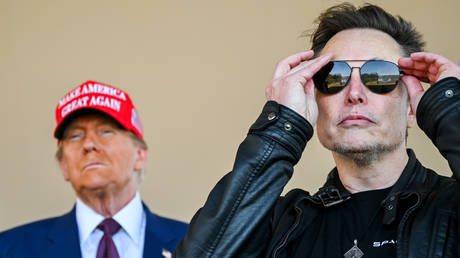The conflict over H-1B visas reveals a profound issue in America
The Musk-Bannon conflict highlights that American elites still struggle to grasp the genuine issues facing their country.

To paraphrase the American film classic, ‘The Big Lebowski,’ say what you will about Trumpism, but at least it’s neither united nor dull.
Elon Musk, recently dubbed President-elect Donald Trump’s “first buddy,” has taken to his platform, X, to encourage fellow Trump supporters to “take a big step back and F**K YOURSELF in the face.” As a co-leader of a new Department of Government Efficiency, Musk further threatened to “go to war” with a fervor beyond ordinary comprehension.
In response, Stephen Bannon, a prominent figure in far-right nationalism and former close ally of Trump, labeled Musk a “man-child” and “toddler” in need of “child services,” accusing him of cowardice for “punching down” instead of confronting adversaries on an equal footing.
On his podcast, ‘The War Room,’ Bannon expressed his commitment to achieving “victory” with a “fixed-bayonet advance,” demonstrating how turbulent exchanges among middle-aged American alpha males can easily escalate into grandiose fantasies of heroism. The U.S. has been at war for 231 of its 248 years, and such an environment cultivates militaristic mentalities.
Amid this clash of titans, X was buzzing with accusations against Musk for allegedly censoring dissenting voices, prompting its own Grok AI to note the “Free Speech Debate” surrounding Musk’s actions. Grok wryly concluded that some users were advocating for a “nuanced view where free speech is selectively applied.” The development proved that even artificial intelligence can grasp the absurdities of human squabbles.
This altercation represents just the starting point of deep rifts within Trumpism 2.0. The intense back-and-forth was triggered by the contentious H-1B visa program, which Musk supports while Bannon staunchly opposes.
However, like many explosive arguments, the H-1B issue is merely a symptom of deeper, unresolved tensions within this faction. The underlying concerns stretch far beyond visas, touching upon domestic class issues and international geopolitics, as well as the true essence of Trumpist ideals: making America great and putting it first.
The tension is not new; in recent weeks, we have seen a couple of significant disputes within Trumpism, including a previous but less sensational disagreement over budgetary constraints and public debt. This pattern suggests an alarming schism within the movement. If the newfound power cannot foster unity, what good is it?
The fissures in Trumpism are not just long-term concerns; they have immediate political implications. For instance, during the budgeting dispute, Trump faced embarrassment after a small but vocal rebellion within his party that he could not quell. Allegedly influenced by Musk, Team Trump had to publicly deny his “first buddy's” inappropriate sway. Despite attempts to intimidate dissenters, they defied his authority.
This politically awkward situation foreshadows future challenges, especially as the Republicans’ grip on the House is now described by the Wall Street Journal as a “razor-thin majority.” Trump will step back into the White House appearing weaker than immediately after his stunning comeback victory in November, which hardly goes unnoticed in commentary circles like those at the New York Times.
Following several days of silence, Trump ultimately sided with Musk and other proponents of the H-1B visa program, even though he had criticized it previously. Musk celebrated, although Trump confused H-1B with other visa types that serve different purposes. This oversight underscores a broader disinterest in detail prevalent in American elite politics. Nowadays, it's a relief when a U.S. president can simply locate the exit. In this case, Trump’s response was noticeably less combative than in his previous confrontation, reflecting a “Kids, stop squabbling in the backseat, dad has to drive!” approach.
This caution is understandable. Given the stakes, how many blunders can one endure before inauguration day? Trump’s moderated stance resonates with the broader implications tied to the seemingly minor H-1B issue.
The H-1B visa program permits 85,000 individuals to work in the U.S. each year. Given a population of 333 million and a civilian labor force nearing 170 million, the real sensitivity surrounding H-1B stems not from the numbers but from who it allows into the U.S. labor market. This program aims to attract highly skilled individuals, often educated abroad.
Musk sees H-1B as a way to keep the U.S. competitive and even dominant, akin to the way “national” sports teams recruit foreign talent. In contrast, Bannon decries it as a “total and complete scam,” concocted by the “lords of easy money on Wall Street and the oligarchs in Silicon Valley.”
While he acknowledges that it initially aimed at profit maximization, Bannon now claims there is a “darker element” to this scheme—a “contempt for America and American citizens.” Both men present valid arguments, yet neither can be entirely trusted.
Overall, this dispute is less a battle between enlightened tech elites advocating for migrants and sinister nativists resisting change. Both Musk and Bannon are shrewd operators who operate on an international scale; both are also ruthless. Concepts like humanity or fairness are not fundamental to their endeavors.
Politically, the dispute illustrates a conflict between two critical factions of Trumpism 2.0. For the oligarchs represented by Musk, the U.S. serves primarily as a base for an increasingly feudal capitalist system that enriches them. Ordinary citizens, irrespective of ethnicity, are merely tools to ensure some semblance of compliance under the guise of democracy. Musk’s frequent critiques of American educational shortcomings do not reflect a desire to improve education for all but rather a fixation on sourcing talent from abroad. Thus, the notion of putting America first dims significantly.
On the other side, Bannon insists that businesses profiting within the U.S. must address their labor demands by developing local talent. He passionately argues that tech elites must “honor the citizens” who essentially provide the foundation for their success. Though his rhetoric may seem harsh and demagogic, he raises fair points.
The issue with Bannon’s anger lies not in the validity of his concerns but in his framing of the problem. He fixates on insufficient national loyalty instead of recognizing its roots in rampant inequality and exploitation. In his eyes, Musk becomes a symbol of bad Americanism. Musk's overly sensitive and slightly unhinged reactions reveal his inner insecurities as a first-generation immigrant. Yet, both men embody quintessential American attitudes in their unquestioned belief that life’s primary purpose entails the relentless pursuit of wealth and power, no matter the cost to others.
The H-1B debate reveals the deeper significance behind such policies. Beyond their superficial charm of opportunity and advancement, they reflect America’s patterns of global parasitism, targeting individuals educated and prepared elsewhere. Bannon objections stem not from a moral standpoint but from the belief that wealthy elites have become too cavalier in their treatment of American labor, viewing them as a disposable workforce to be utilized as efficiently as possible.
These internal conflicts within Trumpism are not solely an issue of American domestic politics. They underscore a critical fault line between the globalist oligarchs with immense financial resources and populist counter-elites mobilizing the grievances of those left behind.
Moreover, the United States is, as history shows, an empire in decline. The quest for foreign skills serves as a crucial indicator of this deterioration. In “La Défaite de l’Occident,” French intellectual Emmanuel Todd highlights the weakness of the American economy by examining its failure to supply sufficient munitions for the proxy war in Ukraine. He notes that in 1928, the U.S. was responsible for nearly half of global industrial production, but by 2019, that figure fell to 16.8%. Similarly, while China produced almost a quarter of all machine tools in 2018, the U.S. only produced 6.6%.
Todd emphasizes that an economy is primarily composed of skilled individuals. Nevertheless, only 7.2% of American students pursue engineering degrees. The U.S. has experienced a “brain drain” toward law, finance, and business sectors, creating what Todd critiques as a proliferation of “diploma multiplying parasites.”
To compensate for this shift away from producing skilled labor, the U.S. has ramped up the importation of STEM workers, jumping from 16.5% of the overall STEM workforce in 2000 to 23.1% in 2019. Notably, imported STEM workers are typically more educated than their American counterparts, with 67.3% of U.S.-born workers holding a BA degree compared to 86.5% of foreign-born workers. These statistics hint at deeper systemic issues, with the H-1B phenomenon representing just a small part of a broader decline in education and training.
The reliance on foreign talent, however, is a precarious strategy. Such dependence only holds as long as other nations appear less attractive than the United States. Unfortunately, the U.S. is increasingly losing that allure. Factors like dysfunctional public services, outdated infrastructure, and societal issues diminish its appeal compared to countries with superior education systems and public transportation networks.
Interestingly, both Musk and Bannon, despite their diverging viewpoints, claim to champion the cause of making America great again. Musk envisions a techno-feudal capitalist empire in which nations are simply variables in the production equation. Bannon seeks a nationalist vision that preserves privileges for a significant segment of the domestic populace.
Yet neither approach addresses the underlying rot at the heart of America. Genuine recovery necessitates humility. It requires a shift from seeking dominance toward prioritizing literacy, numeracy, and fairness—the essential ingredients for unifying a diverse populace in pursuit of common goals.
Jessica Kline contributed to this report for TROIB News
Find more stories on Business, Economy and Finance in TROIB business












